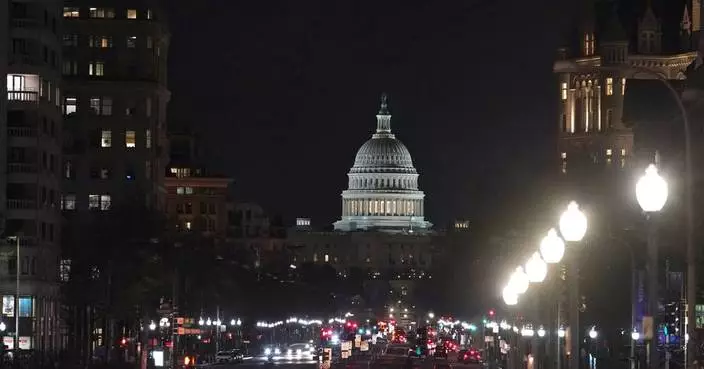WELLINGTON, New Zealand (AP) — As tens of thousands of marchers crowded the streets in New Zealand’s capital Wellington on Tuesday, the throng of people, flags aloft, had the air of a festival or a parade rather than a protest. They arrived to oppose a law that would reshape the county’s founding treaty between Indigenous Māori and the British Crown. But for many, it was about something more: a celebration of a resurging Indigenous language and identity that colonization had once almost destroyed.
“Just fighting for the rights that our tūpuna, our ancestors, fought for,” Shanell Bob said as she waited for the march to begin. “We’re fighting for our tamariki, for our mokopuna, so they can have what we haven’t been able to have,” she added, using the Māori words for children and grandchildren.
Click to Gallery
Thousands of people gather outside New Zealand's parliament to protest a proposed law that would redefine the country's founding agreement between Indigenous Māori and the British Crown, in Wellington Tuesday, Nov. 19, 2024. (AP Photo/Charlotte McLay-Graham)
Thousands of people gather outside New Zealand's parliament to protest a proposed law that would redefine the country's founding agreement between Indigenous Māori and the British Crown, in Wellington Tuesday, Nov. 19, 2024. (AP Photo/Mark Tantrum)
Thousands of people gather outside New Zealand's parliament to protest a proposed law that would redefine the country's founding agreement between Indigenous Māori and the British Crown, in Wellington Tuesday, Nov. 19, 2024. (AP Photo/Mark Tantrum)
ACT Party leader David Seymour, center, looks on as thousands of people gather outside New Zealand's parliament to protest a proposed law that would redefine the country's founding agreement between Indigenous Māori and the British Crown, in Wellington Tuesday, Nov. 19, 2024. (AP Photo/Mark Tantrum)
Protesters march carrying placards to New Zealand's parliament to demonstrate against a proposed law that would redefine the country's founding agreement between Indigenous Māori and the British Crown, in Wellington, New Zealand, Tuesday, Nov. 19, 2024. (AP Photo/Mark Tantrum)
Indigenous Māori people walk through the streets of Wellington, New Zealand to protest against a proposed law that would redefine the country's founding agreement between Indigenous Māori and the British Crown, Tuesday, Nov. 19, 2024. (AP Photo/Mark Tantrum)
Indigenous Māori reacts outside New Zealand's parliament to protest against a proposed law that would redefine the country's founding agreement between Indigenous Māori and the British Crown, in Wellington, New Zealand, Tuesday, Nov. 19, 2024. (AP Photo/Mark Tantrum)
A protester reacts outside New Zealand's parliament during a demonstration against a proposed law that would redefine the country's founding agreement between Indigenous Māori and the British Crown, in Wellington Tuesday, Nov. 19, 2024. (AP Photo/Mark Tantrum)
Members of Te Āti Awa, join thousands of people gathered outside New Zealand's parliament to protest a proposed law that would redefine the country's founding agreement between Indigenous Māori and the British Crown, in Wellington Tuesday, Nov. 19, 2024. (AP Photo/Mark Tantrum)
A petition is delivered to Member of Parliament Rawiri Waititi, left, outside New Zealand's parliament during a protest against a proposed law that would redefine the country's founding agreement between Indigenous Māori and the British Crown, in Wellington Tuesday, Nov. 19, 2024. (AP Photo/Mark Tantrum)
Thousands of people gather outside New Zealand's parliament to protest a proposed law that would redefine the country's founding agreement between Indigenous Māori and the British Crown, in Wellington Tuesday, Nov. 19, 2024. (AP Photo/Mark Tantrum)
Indigenous Māori gather outside Parliament in Wellington, New Zealand, Tuesday, Nov. 19, 2024. (AP Photo/Mark Tantrum)
A man carries a child on his shoulders outside New Zealand's parliament during a protest against a proposed law that would redefine the country's founding agreement between Indigenous Māori and the British Crown, in Wellington Tuesday, Nov. 19, 2024. (AP Photo/Mark Tantrum)
Te Haukūnui Hokianga plays a conch shell ahead of a protest at New Zealand's parliament against a proposed law that would redefine the country's founding agreement between Indigenous Māori and the British Crown, in Wellington, New Zealand, Tuesday, Nov. 19, 2024. (AP Photo/Mark Tantrum)
Hana-Rāwhiti Maipi-Clarke speaks to the thousands of people gathered outside New Zealand's parliament to protest a proposed law that would redefine the country's founding agreement between Indigenous Māori and the British Crown, in Wellington Tuesday, Nov. 19, 2024. (AP Photo/Mark Tantrum)
New Zealand's opposition leader Chris Hipkins, left, does a hongi with Hare Arapere as people gathered outside New Zealand's parliament to protest a proposed law that would redefine the country's founding agreement between Indigenous Māori and the British Crown, in Wellington Tuesday, Nov. 19, 2024. (AP Photo/Mark Tantrum)
Thousands of people gather outside New Zealand's parliament to protest a proposed law that would redefine the country's founding agreement between Indigenous Māori and the British Crown, in Wellington Tuesday, Nov. 19, 2024. (AP Photo/Mark Tantrum)
Indigenous Māori people protest outside Parliament against a proposed law that would redefine the country's founding agreement between Indigenous Māori and the British Crown, in Wellington, New Zealand, Tuesday, Nov. 19, 2024. (AP Photo/Mark Tantrum)
Thousands of people gather outside New Zealand's parliament to protest a proposed law that would redefine the country's founding agreement between Indigenous Māori and the British Crown, in Wellington Tuesday, Nov. 19, 2024. (AP Photo/Charlotte McLay-Graham)
What was likely the country’s largest-ever protest in support of Māori rights — a subject that has preoccupied modern New Zealand for much of its young history — followed a long tradition of peaceful marches the length of the country that have marked turning points in the nation's story.
“We’re going for a walk!” One organizer proclaimed from the stage as crowds gathered at the opposite end of the city from the nation’s Parliament. Some had traveled the length of the country over the past nine days.
For many, the turnout reflected growing solidarity on Indigenous rights from non-Māori. At bus stops during the usual morning commute, people of all ages and races waited with Māori sovereignty flags. Some local schools said they would not register students as absent. The city’s mayor joined the protest.
The bill that marchers were opposing is unpopular and unlikely to become law. But opposition to it has exploded, which marchers said indicated rising knowledge of the Treaty of Waitangi’s promises to Māori among New Zealanders — and a small but vocal backlash from those who are angered by the attempts of courts and lawmakers to keep them.
Māori marching for their rights as outlined in the treaty is not new. But the crowds were larger than at treaty marches before and mood was changed, Indigenous people said.
“It’s different to when I was a child,” Bob said. “We’re stronger now, our tamariki are stronger now, they know who they are, they’re proud of who they are.”
As the marchers moved through the streets of Wellington with ringing Māori haka — rhythmic chants — and waiata, or songs, thousands more holding signs lined the pavement in support.
Some placards bore jokes or insults about the lawmakers responsible for the bill, which would change the meaning of the principles of the 1840 Treaty of Waitangi and prevent them from applying only to Māori — whose chiefs signed the document when New Zealand was colonized.
But others read “proud to be Māori” or acknowledged the bearer’s heritage as a non-Māori person endorsing the protest. Some denounced the widespread expropriation of Māori land during colonization, one of the main grievances arising from the treaty.
“The treaty is a document that lets us be here in Aotearoa so holding it up and respecting it is really important,” said Ben Ogilvie, who is of Pākehā or New Zealand European descent, using the Māori name for the country. “I hate what this government is doing to tear it down.”
Police said 42,000 people tried to crowd into Parliament’s grounds, with some spilling into the surrounding streets. People crammed themselves onto the children's slide on the lawn for a vantage point; others perched in trees. The tone was almost joyful; as people waited to leave the cramped area, some struck up Māori songs that most New Zealanders learn at school.
A sea of Māori sovereignty flags in red, black and white stretched down the lawn and into the streets. But marchers bore Samoan, Tongan, Indigenous Australian, U.S., Palestinian and Israeli flags, too. At Parliament, speeches from political leaders drew attention to the reason for the protest — a proposed law that would change the meaning of words in the country’s founding treaty, cement them in law and extend them to everyone.
Its author, libertarian lawmaker David Seymour — who is Māori — says the process of redress for decades of Crown breaches of its treaty with Māori has created special treatment for Indigenous people, which he opposes.
The bill’s detractors say it would spell constitutional upheaval, dilute Indigenous rights, and has provoked divisive rhetoric about Māori — who are still disadvantaged on almost every social and economic metric, despite attempts by the courts and lawmakers in recent decades to rectify inequities caused in large part by breaches of the treaty.
It is not expected to ever become law, but Seymour made a political deal that saw it shepherded through a first vote last Thursday. In a statement Tuesday, he said the public could now make submissions on the bill — which he hopes will reverse in popularity and experience a swell of support.
Seymour briefly walked out onto Parliament’s forecourt to observe the protest, although he was not among the lawmakers invited to speak. Some in the crowd booed him.
The protest was “a long time coming,” said Papa Heta, one of the marchers, who said Māori sought acknowledgement and respect.
“We hope that we can unite with our Pākehā friends, Europeans," he added. "Unfortunately there are those that make decisions that put us in a difficult place.”

Thousands of people gather outside New Zealand's parliament to protest a proposed law that would redefine the country's founding agreement between Indigenous Māori and the British Crown, in Wellington Tuesday, Nov. 19, 2024. (AP Photo/Charlotte McLay-Graham)
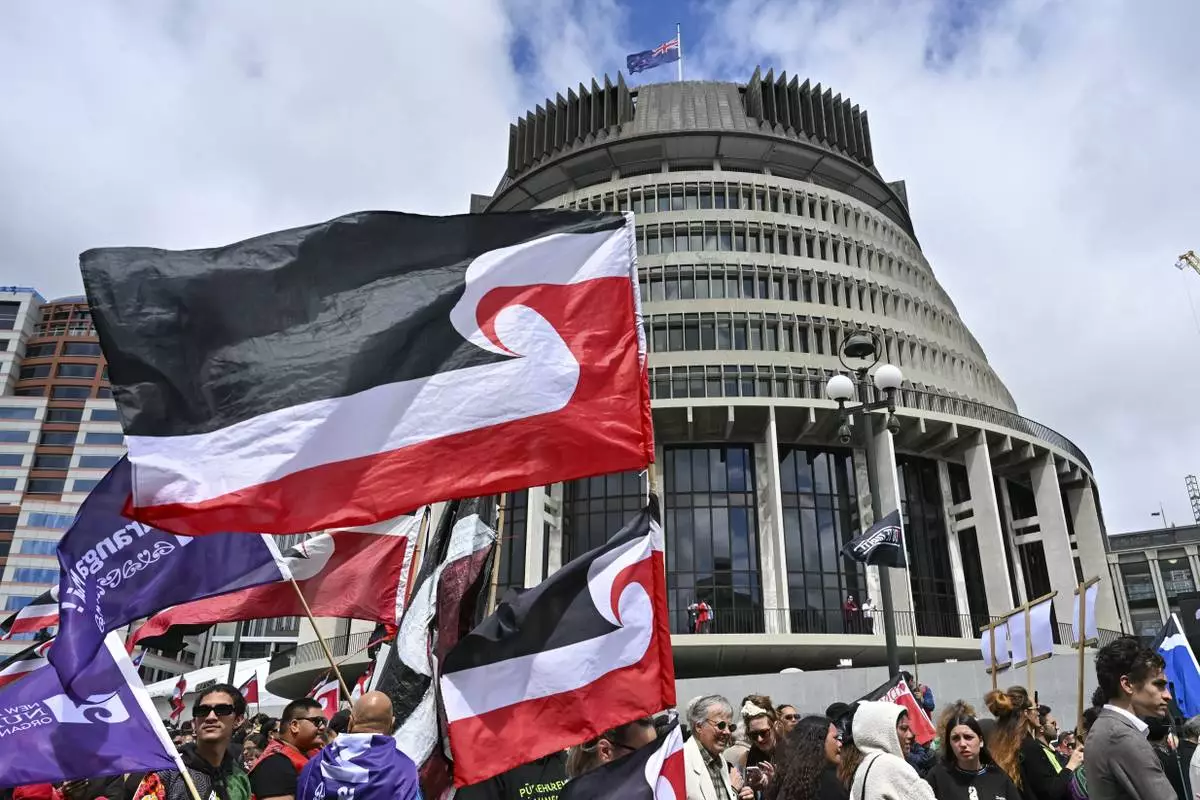
Thousands of people gather outside New Zealand's parliament to protest a proposed law that would redefine the country's founding agreement between Indigenous Māori and the British Crown, in Wellington Tuesday, Nov. 19, 2024. (AP Photo/Mark Tantrum)

Thousands of people gather outside New Zealand's parliament to protest a proposed law that would redefine the country's founding agreement between Indigenous Māori and the British Crown, in Wellington Tuesday, Nov. 19, 2024. (AP Photo/Mark Tantrum)

ACT Party leader David Seymour, center, looks on as thousands of people gather outside New Zealand's parliament to protest a proposed law that would redefine the country's founding agreement between Indigenous Māori and the British Crown, in Wellington Tuesday, Nov. 19, 2024. (AP Photo/Mark Tantrum)
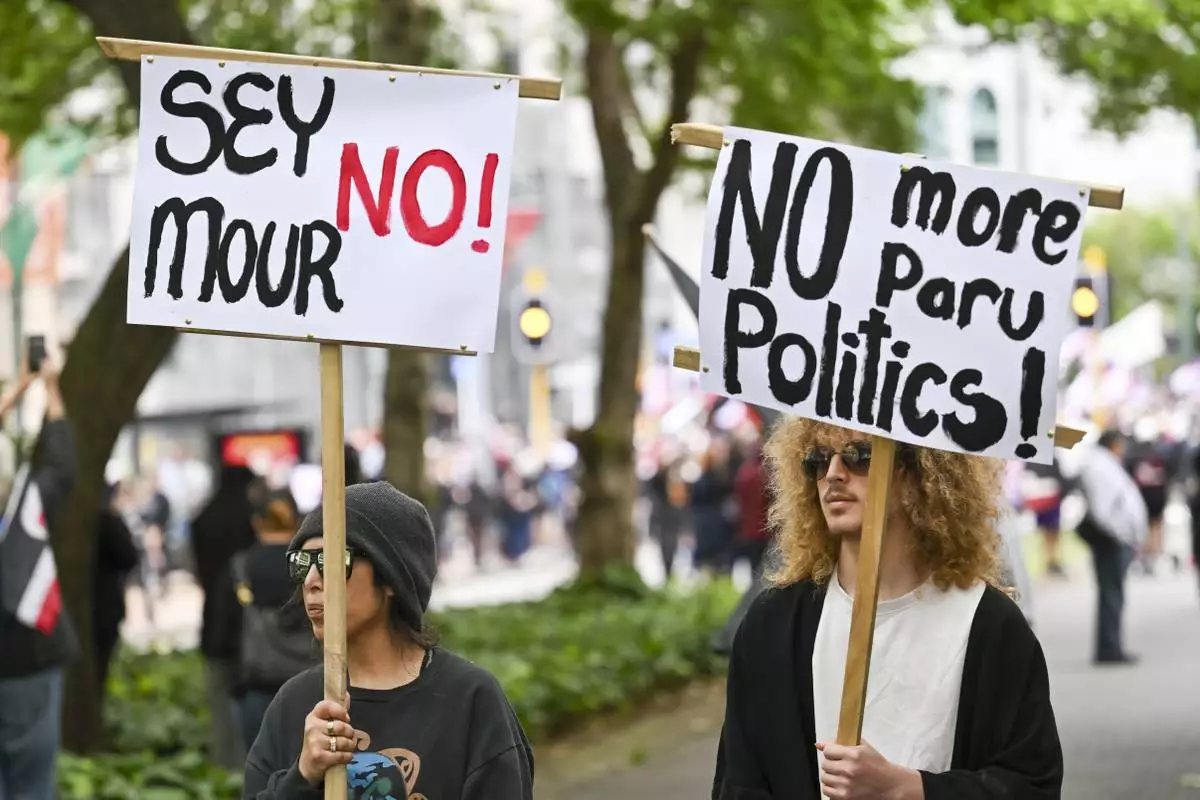
Protesters march carrying placards to New Zealand's parliament to demonstrate against a proposed law that would redefine the country's founding agreement between Indigenous Māori and the British Crown, in Wellington, New Zealand, Tuesday, Nov. 19, 2024. (AP Photo/Mark Tantrum)
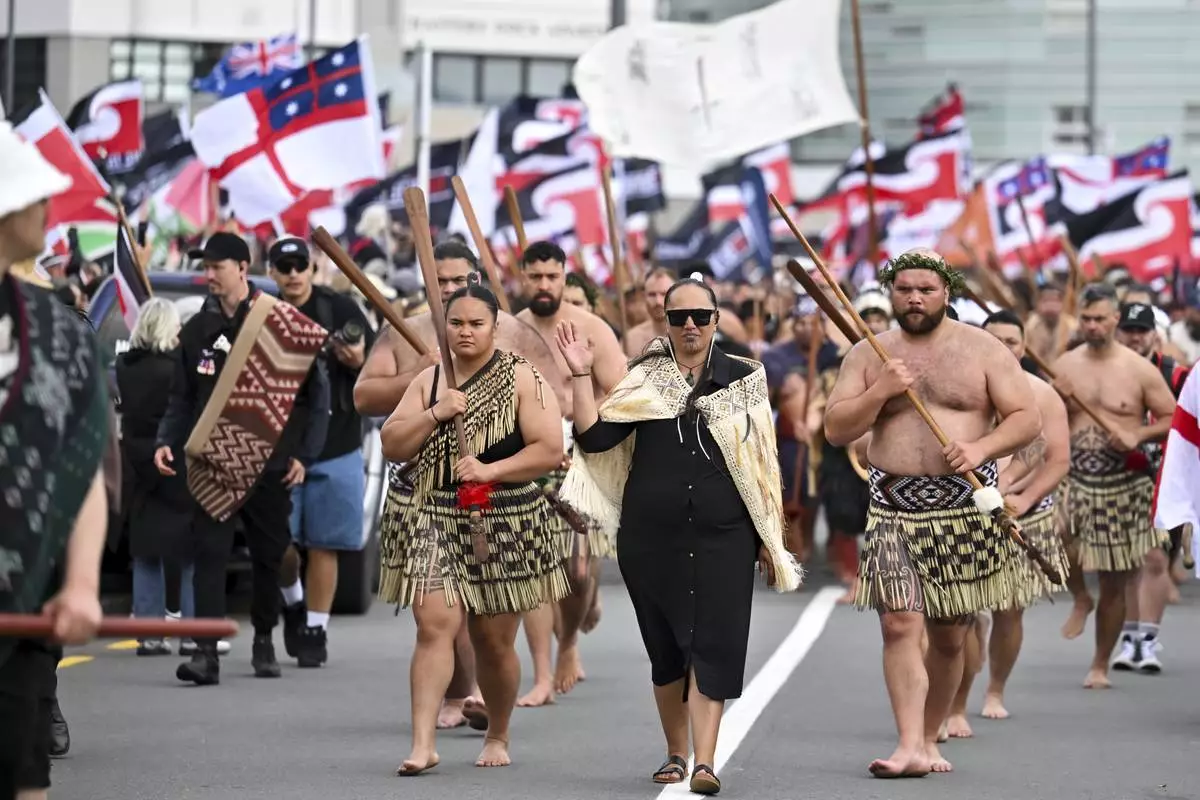
Indigenous Māori people walk through the streets of Wellington, New Zealand to protest against a proposed law that would redefine the country's founding agreement between Indigenous Māori and the British Crown, Tuesday, Nov. 19, 2024. (AP Photo/Mark Tantrum)
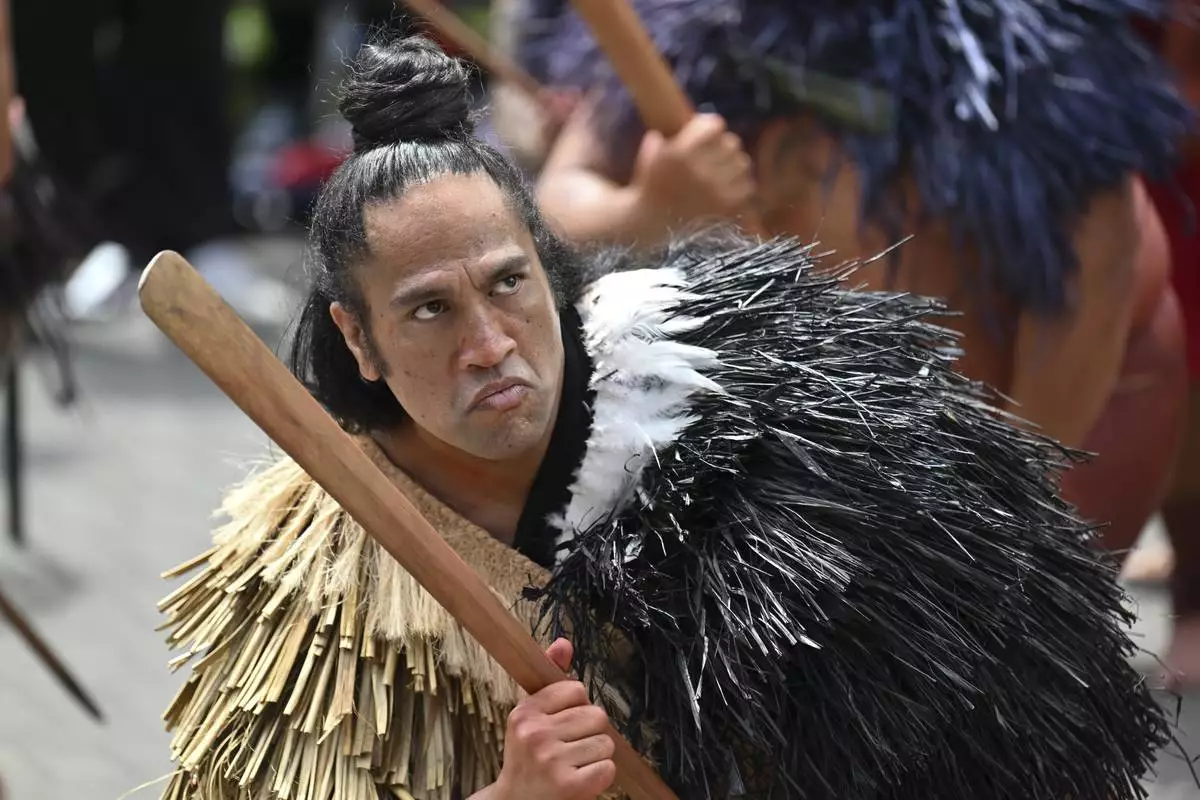
Indigenous Māori reacts outside New Zealand's parliament to protest against a proposed law that would redefine the country's founding agreement between Indigenous Māori and the British Crown, in Wellington, New Zealand, Tuesday, Nov. 19, 2024. (AP Photo/Mark Tantrum)

A protester reacts outside New Zealand's parliament during a demonstration against a proposed law that would redefine the country's founding agreement between Indigenous Māori and the British Crown, in Wellington Tuesday, Nov. 19, 2024. (AP Photo/Mark Tantrum)
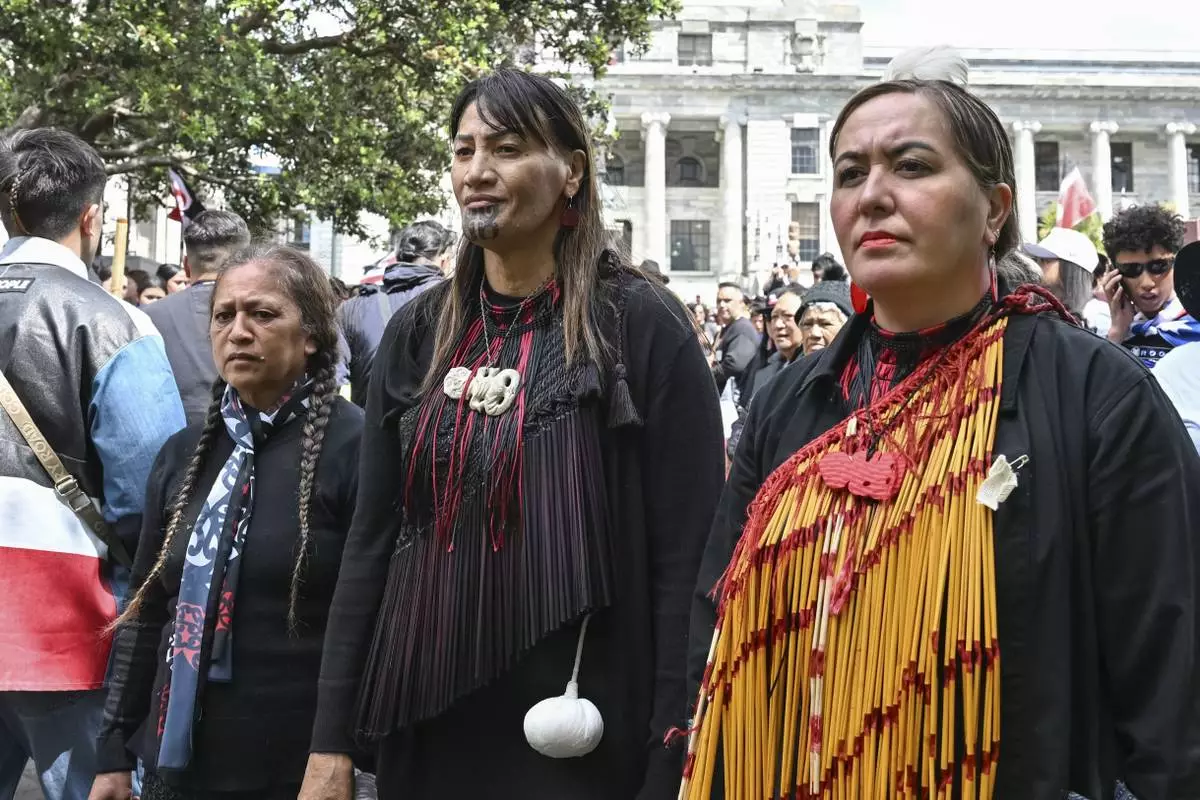
Members of Te Āti Awa, join thousands of people gathered outside New Zealand's parliament to protest a proposed law that would redefine the country's founding agreement between Indigenous Māori and the British Crown, in Wellington Tuesday, Nov. 19, 2024. (AP Photo/Mark Tantrum)
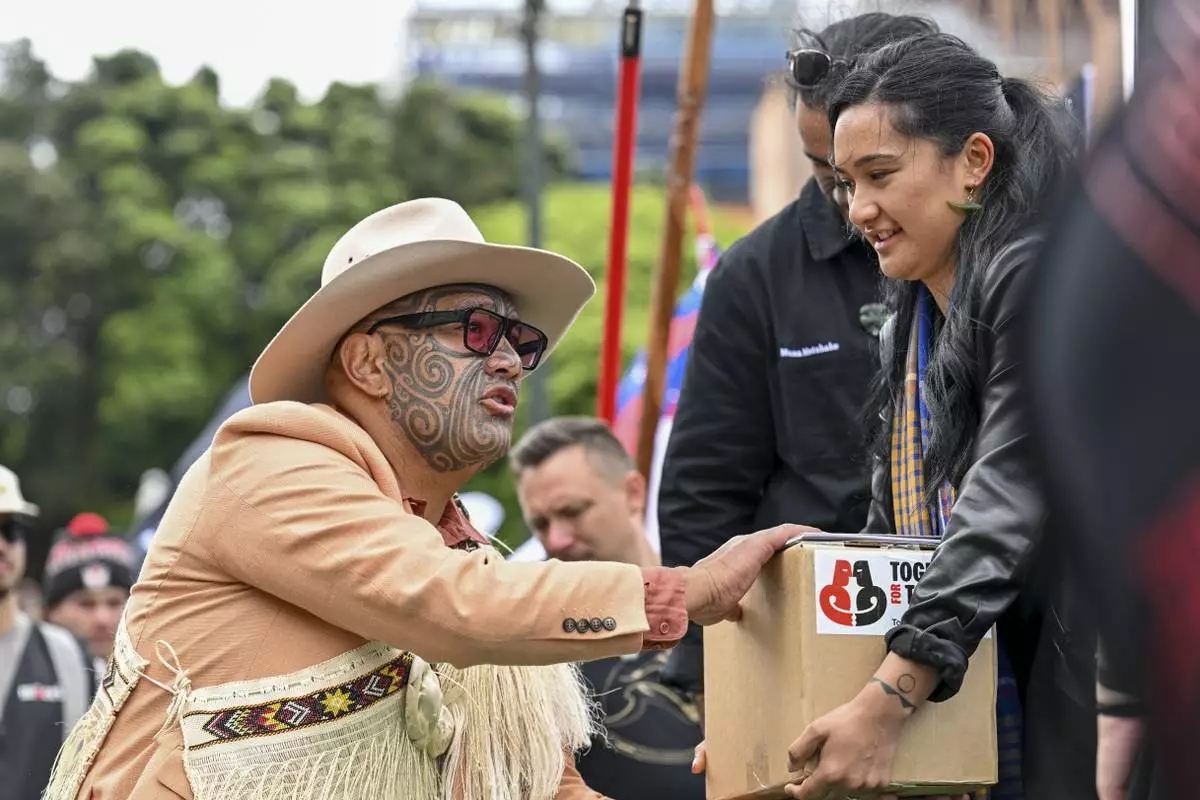
A petition is delivered to Member of Parliament Rawiri Waititi, left, outside New Zealand's parliament during a protest against a proposed law that would redefine the country's founding agreement between Indigenous Māori and the British Crown, in Wellington Tuesday, Nov. 19, 2024. (AP Photo/Mark Tantrum)

Thousands of people gather outside New Zealand's parliament to protest a proposed law that would redefine the country's founding agreement between Indigenous Māori and the British Crown, in Wellington Tuesday, Nov. 19, 2024. (AP Photo/Mark Tantrum)

Indigenous Māori gather outside Parliament in Wellington, New Zealand, Tuesday, Nov. 19, 2024. (AP Photo/Mark Tantrum)

A man carries a child on his shoulders outside New Zealand's parliament during a protest against a proposed law that would redefine the country's founding agreement between Indigenous Māori and the British Crown, in Wellington Tuesday, Nov. 19, 2024. (AP Photo/Mark Tantrum)

Te Haukūnui Hokianga plays a conch shell ahead of a protest at New Zealand's parliament against a proposed law that would redefine the country's founding agreement between Indigenous Māori and the British Crown, in Wellington, New Zealand, Tuesday, Nov. 19, 2024. (AP Photo/Mark Tantrum)

Hana-Rāwhiti Maipi-Clarke speaks to the thousands of people gathered outside New Zealand's parliament to protest a proposed law that would redefine the country's founding agreement between Indigenous Māori and the British Crown, in Wellington Tuesday, Nov. 19, 2024. (AP Photo/Mark Tantrum)
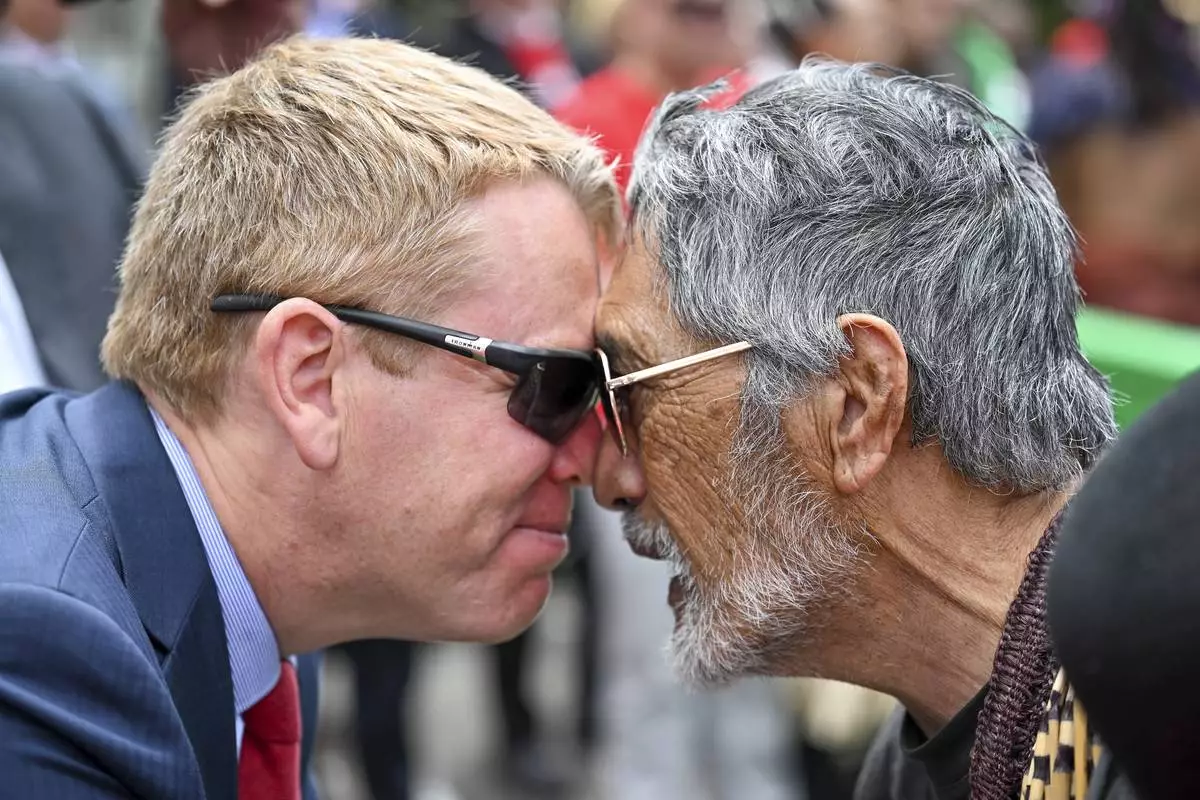
New Zealand's opposition leader Chris Hipkins, left, does a hongi with Hare Arapere as people gathered outside New Zealand's parliament to protest a proposed law that would redefine the country's founding agreement between Indigenous Māori and the British Crown, in Wellington Tuesday, Nov. 19, 2024. (AP Photo/Mark Tantrum)
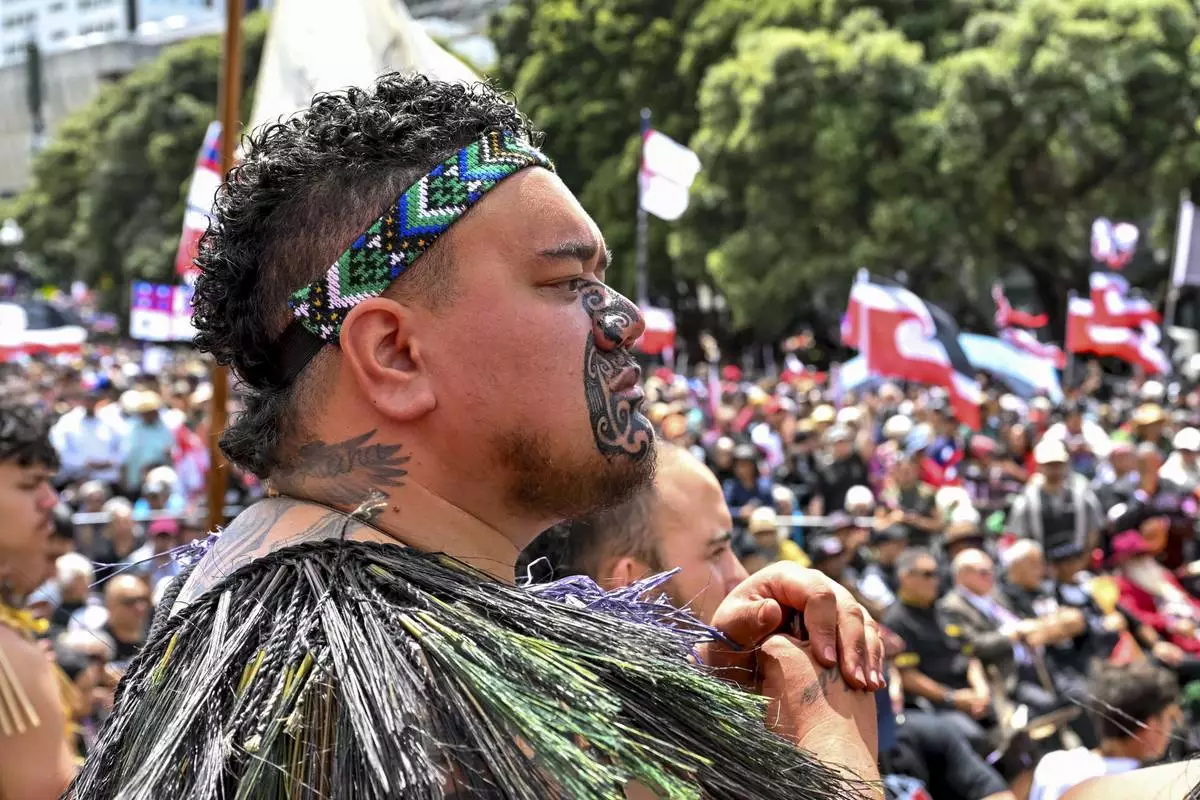
Thousands of people gather outside New Zealand's parliament to protest a proposed law that would redefine the country's founding agreement between Indigenous Māori and the British Crown, in Wellington Tuesday, Nov. 19, 2024. (AP Photo/Mark Tantrum)
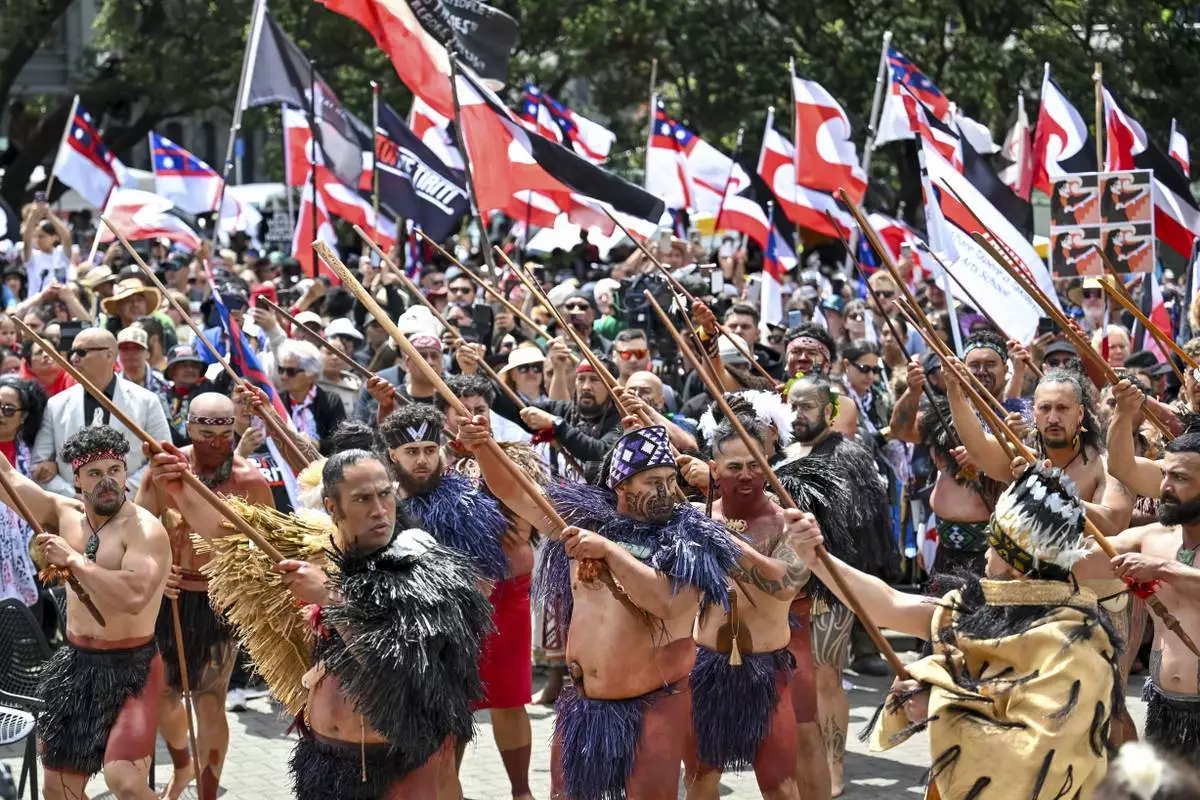
Indigenous Māori people protest outside Parliament against a proposed law that would redefine the country's founding agreement between Indigenous Māori and the British Crown, in Wellington, New Zealand, Tuesday, Nov. 19, 2024. (AP Photo/Mark Tantrum)

Thousands of people gather outside New Zealand's parliament to protest a proposed law that would redefine the country's founding agreement between Indigenous Māori and the British Crown, in Wellington Tuesday, Nov. 19, 2024. (AP Photo/Charlotte McLay-Graham)
ARLINGTON, Texas (AP) — Derek Barnett forced the first fumble and returned the second for a touchdown on the definitive defensive play of the game for the Houston Texans.
Joe Mixon did his thing, and C.J. Stroud didn’t have to do much to extend the misery of the Dallas Cowboys.
Mixon ran for three touchdowns to extend his TD streak to six games since coming back from an ankle injury, Barnett returned a fumble 28 yards for a score, and the Texans beat the Cowboys 34-10 on Monday night.
The Texans (7-4) stopped just the second two-game losing streak in quarterback C.J. Stroud's two seasons while maintaining a two-game lead in the AFC South.
In a season filled with things gone wrong for the Cowboys (3-7), debris fell from their stadium's retractable roof as it was opening a few hours before the game.
There was no delay and no injuries were reported, just another mishap to foreshadow a fifth consecutive defeat for a team that lost five games total in each of the past three playoff seasons.
Cooper Rush threw a 64-yard touchdown pass to KaVontae Turpin but lost his second start since Dak Prescott's season-ending hamstring injury.
The Dallas losing streak is its longest since a seven-game skid in 2015, and the Cowboys dropped to 0-5 at home. Dallas is the first team in NFL history to trail by at least 20 points in six consecutive home games, including last season's wild-card playoff loss to Green Bay, according to Sportradar.
“Well, they better be frustrated,” coach Mike McCarthy said. “I mean, we’re all frustrated. I think there’d be something wrong if they weren’t frustrated. So just very honest with everything and stay in tune with what’s right in front of us. And that’s the only way I’ve ever done it.”
The Cowboys were down 10 early in the fourth quarter when Barnett knocked the ball out of Rush's hand as he was throwing. Dallas rookie left tackle Tyler Guyton caught it and was trying to run when Jalen Pitre knocked the ball loose again.
Barnett scooped it and scored, although he almost stepped out of bounds running free toward a pylon.
“The play he made really changed for game for us,” Texans coach DeMeco Ryans said. “It flipped the momentum. It got everybody juiced up on the sideline. It was just a huge play.”
Earlier, the Cowboys appeared to have pulled within a touchdown on a 64-yard field goal from Brandon Aubrey, but Barnett was penalized for slapping Terence Steele on the rush.
Dallas erased the points by taking the penalty, but Rush's fourth-down pass from the Houston 8-yard line was incomplete on the only good scoring chance of the second half for the the Cowboys.
“The defense played with elite energy,” Ryans said. “One big play that we gave up. Like to have that one back, but overall I think our guys played really well.”
Texans receiver Nico Collins returned after missing five games with a hamstring injury and took a screen pass 77 yards to the end zone the first time he touched the ball on the first play of the game, only to have it called back because of an ineligible receiver downfield.
That possession ended with a touchdown anyway on Mixon's 45-yard sprint up the middle, and he ran wide for a 1-yard score and 14-0 lead. Mixon had 109 yards rushing and set up a field goal with a 37-yard catch-and-run on a screen.
“I really love that first play because it showed what we could do in this game,” Ryans said. “Even though it got called back, I just told all our guys, ‘We can go score on these guys again. Just get it in your mind we’re going to score again.’”
Already without Prescott, the Cowboys lost tight end Jake Ferguson to a concussion and perennial All-Pro right guard Zack Martin and left guard Tyler Smith to ankle injuries. Rush was sacked five times, three on the same possession when Martin and Smith were injured.
Stroud, who has been in a mini-slump, threw for 257 yards while avoiding any mistakes after an early interception on fourth down. It was the third time in five games without a touchdown pass, and he has two TDs and three picks in that stretch.
Rush was 32 of 55 for 354 yards with a touchdown and an interception. Turpin had three catches for 86 yards.
Texans DE Will Anderson Jr., who entered the week tied for fifth in the NFL with 7 1/2 sacks, was inactive because of an ankle injury. ... Cowboys DB Markquese Bell didn't return after injuring a shoulder covering a kickoff in the second quarter.
Texans: Host Tennessee on Sunday.
Cowboys: At Washington on Sunday.
AP NFL: https://apnews.com/hub/nfl

Houston Texans quarterback C.J. Stroud, right, gets help from offensive tackle Laremy Tunsil, left, to escape a tackle attempt by Dallas Cowboys quarterback Trey Lance during the second half of an NFL football game, Monday, Nov. 18, 2024, in Arlington, Texas. (AP Photo/Tony Gutierrez)

Houston Texans defensive end Derek Barnett (95) celebrates with teammates after scoring on a fumble recovery during the second half of an NFL football game against the Dallas Cowboys, Monday, Nov. 18, 2024, in Arlington, Texas. (AP Photo/Jerome Miron)

Dallas Cowboys quarterback Cooper Rush (10) tries to avoid being stopped by Houston Texans defensive end Denico Autry (96) and defensive end Derek Barnett (95) during the second half of an NFL football game, Monday, Nov. 18, 2024, in Arlington, Texas. (AP Photo/Tony Gutierrez)

Houston Texans linebacker Azeez Al-Shaair reacts after a play against the Dallas Cowboys during the second half of an NFL football game, Monday, Nov. 18, 2024, in Arlington, Texas. (AP Photo/Tony Gutierrez)

Dallas Cowboys quarterback Cooper Rush fumbles the snap against the Houston Texans during the second half of an NFL football game, Monday, Nov. 18, 2024, in Arlington, Texas. (AP Photo/Gareth Patterson)

Houston Texans running back Joe Mixon runs for a touchdown against the Dallas Cowboys during the first half of an NFL football game, Monday, Nov. 18, 2024, in Arlington, Texas. (AP Photo/Tony Gutierrez)

A employee labors on the catwalk of AT&T Stadium prior to an NFL football game between the Dallas Cowboys and the Houston Texans, Monday, Nov. 18, 2024, in Arlington. (AP Photo/Jerome Miron)

The roof is seen open at AT&T Stadium prior to an NFL football game between the Dallas Cowboys and the Houston Texans, Monday, Nov. 18, 2024, in Arlington. (AP Photo/Jerome Miron)

Houston Texans defensive end Dylan Horton, left, forces Dallas Cowboys offensive tackle Tyler Guyton, center, to fumble the ball during the second half of an NFL football game, Monday, Nov. 18, 2024, in Arlington, Texas. (AP Photo/Tony Gutierrez)

Houston Texans defensive end Derek Barnett runs with the ball while scoring on a fumble recovery during the second half of an NFL football game against the Dallas Cowboys, Monday, Nov. 18, 2024, in Arlington, Texas. (AP Photo/Jerome Miron)





















































